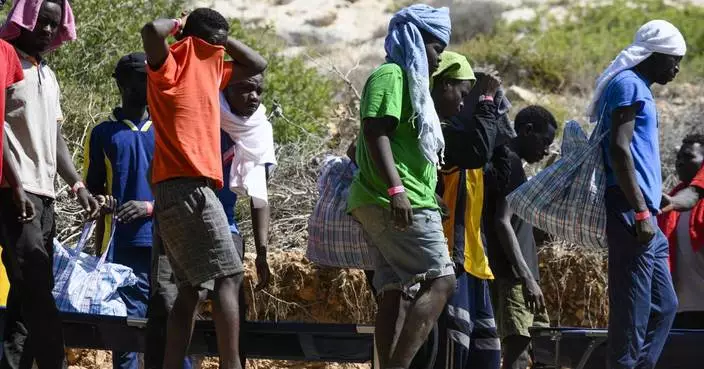The European Union said Monday that it will consider Iran to be complying with its obligations under a global nuclear deal up until the point scientific evidence emerges that it has breached its commitments.
Hours after Iran said it could break the uranium stockpile limit set by the 2015 nuclear deal with world powers in the next 10 days, the EU's foreign policy chief said the 28-country bloc will continue to do what it can to make sure the agreement holds.
Federica Mogherini said work is ongoing on putting in place "a mechanism that can allow the Iranians to benefit from the economic transactions that can legitimately take place."
She would not speculate what would happen if Tehran veers away from the terms of the global deal. Mogherini said that "so far, Iran has been compliant with its nuclear commitment as we had expected it to be," and insisted she would await the next report on the issue from the U.N.'s nuclear watchdog, the International Atomic Energy Agency.
The foundations of the landmark agreement, which put limits on Iran's nuclear ambitions in return for economic support, have grown weaker since President Donald Trump pulled the United States out of the agreement last year and then slapped sanctions on Iran.
"It is not an easy exercise," Federica Mogherini said. "We never made a mystery out of it ... during the last year it has become increasingly difficult for all."
The EU, notably Britain, France and Germany, who were signatories to the 2015 deal, have been trying to make sure that Tehran abides by the terms of the agreement and hope financial inducements to Tehran will help out.
Germany, a key partner in the agreement, said it is up to Iran to stick to the nuclear deal if it wants to avoid any further unspecified measures.
Foreign Minister Heiko Maas said in Luxembourg that Germany, France, Britain, China and Russia were keeping their obligations under the nuclear deal and that it is "incumbent upon Iran to remain committed to its responsibilities."
"I have the impression that a lot is being threatened, by the way from both sides, and I don't see that as very constructive," he said.
Separately, EU nations were also still evaluating information on the apparent attacks against two tankers in the Persian Gulf last week.
Monday's announcement that Iran will surpass the uranium-stockpile limit set by its nuclear deal in the next 10 days, follows apparent attacks last week in the Strait of Hormuz on oil tankers, assaults that Washington has blamed on Iran. Iran denies it was involved.
"I consider now, as before, that the situation is extremely explosive," Maas said. "Military confrontation in the Gulf would mean the whole region in flames, and that can't be in anyone's interest."
David Rising contributed from Berlin
BRUSSELS (AP) — European Union nations endorsed sweeping reforms to the bloc’s failed asylum system on Tuesday as campaigning for Europe-wide elections next month gathers pace, with migration expected to be an important issue.
EU government ministers approved 10 legislative parts of The New Pact on Migration and Asylum. It lays out rules for the 27 member countries to handle people trying to enter without authorization, from how to screen them to establish whether they qualify for protection to deporting them if they’re not allowed to stay.
Hungary and Poland, which have long opposed any obligation for countries to host migrants or pay for their upkeep, voted against the package but were unable to block it.
Mainstream political parties believe the pact resolves the issues that have divided member nations since well over 1 million migrants swept into Europe in 2015, most fleeing war in Syria and Iraq. They hope the system will starve the far right of vote-winning oxygen in the June 6-9 elections.
However, the vast reform package will only enter force in 2026, bringing no immediate fix to an issue that has fueled one of the EU’s biggest political crises, dividing nations over who should take responsibility for migrants when they arrive and whether other countries should be obligated to help.
Critics say the pact will let nations detain migrants at borders and fingerprint children. They say it’s aimed at keeping people out and infringes on their right to claim asylum. Many fear it will result in more unscrupulous deals with poorer countries that people leave or cross to get to Europe.
Europe’s asylum laws have not been updated for about two decades. The system frayed and then fell apart in 2015. It was based on the premise that migrants should be processed, given asylum or deported in the country they first enter. Greece, Italy and Malta were left to shoulder most of the financial burden and deal with public discontent. Since then, the ID-check-free zone known as the Schengen Area has expanded to 27 countries, 23 of them EU members. It means that more than 400 million Europeans and visitors, including refugees, are able to move without showing travel documents.
Some 3.5 million migrants arrived legally in Europe in 2023. Around 1 million others were on EU territory without permission. Of the latter, most were people who entered normally via airports and ports with visas but didn’t go home when they expired. The pact applies to the remaining minority, estimated at around 300,000 migrants last year. They are people caught crossing an external EU border without permission, such as those reaching the shores of Greece, Italy or Spain via the Mediterranean Sea or Atlantic Ocean on boats provided by smugglers.
The country on whose territory people land will screen them at or near the border. This involves identity and other checks -– including on children as young as 6. The information will be stored on a massive new database, Eurodac. This screening should determine whether a person might pose a health or security risk and their chances of being permitted to stay. Generally, people fleeing conflict, persecution or violence qualify for asylum. Those looking for jobs are likely to be refused entry. Screening is mandatory and should take no longer than seven days. It should lead to one of two things: an application for international protection, like asylum, or deportation to their home country.
People seeking asylum must apply in the EU nation they first enter and stay until the authorities there work out what country should handle their application. It could be that they have family, cultural or other links somewhere else, making it more logical for them to be moved. The border procedure should be done in 12 weeks, including time for one legal appeal if their application is rejected. It could be extended by eight weeks in times of mass movements of people. Procedures could be faster for applicants from countries whose citizens are not often granted asylum. Critics say this undermines asylum law because applicants should be assessed individually, not based on nationality. People would stay in “reception centers” while it happens, with access to health care and education. Those rejected would receive a deportation order.
To speed things up, a deportation order is supposed to be issued automatically when an asylum request is refused. A new 12-week period is foreseen to complete this process. The authorities may detain people throughout. The EU’s border and coast guard agency would help organize joint deportation flights. Currently, less than one in three people issued with an order to leave are deported. This is often due to a lack of cooperation from the countries these people come from.
The new rules oblige countries to help an EU partner under migratory pressure. Support is mandatory, but flexible. Nations can relocate asylum applicants to their territory or choose some other form of assistance. This could be financial -– a relocation is evaluated at 20,000 euros ($21,462) per person -– technical or logistical. Members can also assume responsibility for deporting people from the partner country in trouble.
Two issues stand out: Will member countries ever fully enact the plan, and will the EU’s executive branch, the European Commission, enforce the new rules when it has chosen not to apply the ones already in place? The commission is due to present a Common Implementation Plan by June. It charts a path and timeline to get the pact working over the next two years, with targets that the EU and member countries should reach. Things could get off to a rocky start. Hungary, which has vehemently opposed the reforms, takes over the EU’s agenda-setting presidency for six months on July 1.
Associated Press journalists Renata Brito in Barcelona, Spain, contributed to this report.

Migrants sit on the deck of the Sea Watch-3 rescue ship in the Maltese search and rescue zone of the Mediterranean Sea on Oct. 19, 2021. IEuropean Union nations will discuss on Tuesday, May 14, 2024, sweeping new reforms to the bloc's failed asylum system as campaigning for Europe-wide elections next month gathers pace, with migration expected to be an important issue. (AP Photo/Valeria Mongelli, File)

FILE - Migrants disembark from a Greek coast vessel after a rescue operation, at the port of Mytilene, on the northeastern Aegean Sea island of Lesbos, Greece, Monday, Aug. 28, 2023. European Union nations will discuss on Tuesday, May 14, 2024, sweeping new reforms to the bloc's failed asylum system as campaigning for Europe-wide elections next month gathers pace, with migration expected to be an important issue. (AP Photo/Panagiotis Balaskas, File)

FILE - Two men share a meal in a makeshift tent camp outside the Petit Chateau reception center in Brussels, Tuesday, Jan. 17, 2023. European Union nations will discuss on Tuesday, May 14, 2024, sweeping new reforms to the bloc's failed asylum system as campaigning for Europe-wide elections next month gathers pace, with migration expected to be an important issue. (AP Photo/Olivier Matthys, File)

FILE -Migrants rest on the deck of Sea Watch-3 rescue ship in Maltese SAR zone, Tuesday, Oct. 19, 2021. European Union nations will discuss on Tuesday, May 14, 2024, sweeping new reforms to the bloc's failed asylum system as campaigning for Europe-wide elections next month gathers pace, with migration expected to be an important issue. (AP Photo/Valeria Mongelli, File)

FILE - A cemetery, filled with graves mostly from migrants trying to reach the Greek island of Lesbos, is seen from above at Kato Tritos village on the northeastern Aegean Sea island of Lesbos, Greece, on Wednesday, April 17, 2024. European Union nations will discuss on Tuesday, May 14, 2024, sweeping new reforms to the bloc's failed asylum system as campaigning for Europe-wide elections next month gathers pace, with migration expected to be an important issue. (AP Photo/Panagiotis Balaskas, File)

FILE - Opponents of France's immigration law protest with banners that read, "Freedom, equality, fraternity" and "no to the immigration law" at Trocadero Plaza near Eiffel Tower in Paris, Sunday, Jan. 21, 2024. European Union nations will discuss on Tuesday, May 14, 2024, sweeping new reforms to the bloc's failed asylum system as campaigning for Europe-wide elections next month gathers pace, with migration expected to be an important issue. (AP Photo/Thomas Padilla, File)

FILE - Refugees wait in line at the Office of Migration in Brussels on Thursday, Oct. 1, 2015. European Union nations will discuss on Tuesday, May 14, 2024, sweeping new reforms to the bloc's failed asylum system as campaigning for Europe-wide elections next month gathers pace, with migration expected to be an important issue. (AP Photo/Geert Vanden Wijngaert, File)

FILE - Migrants aboard a rubber boat end up in the water while others cling on to a centifloat before being rescued by a team of the Sea Watch-3, around 35 miles away from Libya, Monday, Oct. 18, 2021. European Union nations will discuss on Tuesday, May 14, 2024, sweeping new reforms to the bloc's failed asylum system as campaigning for Europe-wide elections next month gathers pace, with migration expected to be an important issue. (AP Photo/Valeria Mongelli, File)

















